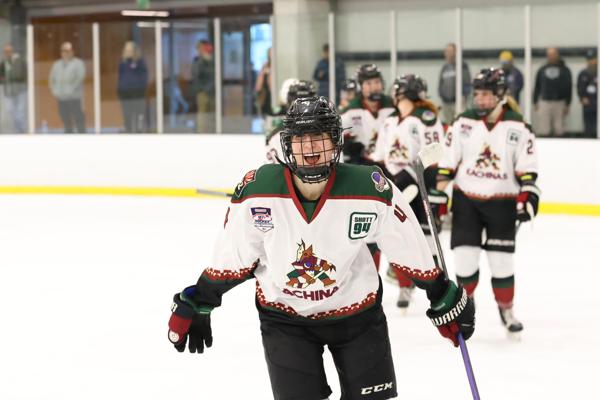USA Hockey: How did you get into coaching?
Emily McNamara: My first coaching role was during my senior year in high school. A friend and I convinced our advisor to let us coach a youth lacrosse team as a senior project. Our project involved starting the first lacrosse program in the town where I grew up. With a new sport in a small town, we had to make a team out of a wide range of ages, so we ended up having 2nd-6th graders. For perspective, the height difference between the tallest and shortest kids was close to 2 feet! Needless to say it was a ton of fun and uniquely challenging. I have so much respect for the patience of youth coaches.
During the fall of my senior year (at Middlebury), my coach, Bill Mandigo, asked if I had any interest in staying at Middlebury to be the assistant coach. To be honest, I hadn’t really thought about going into coaching, but the prospect of not having to look for a job during senior year was very appealing.
USA Hockey: How did you learn, grow, develop and find new opportunities to advance?
Emily McNamara: In a weird way, I think Covid really gave me time to slow down and learn a lot more about coaching and our sport. On top of the extra time, the shutdown led to so much sharing in our small hockey world. I am grateful for how many hockey coaches are open about sharing their ideas. We are so lucky to have access to countless videos and presentations online.
USA Hockey: You were a three-sport athlete. Can you speak to the benefits of multiple sports and dangers of early specialization?
Emily McNamara: I am a huge believer in the value of playing multiple sports when you’re young. Even now, I would guess a week doesn’t go by without me asking a question in practice related to another sport. I think there are so many mental, emotional and physical benefits to playing multiple sports for as long as possible. We always have a handful of multi-sport athletes on our team at Hamilton.
USA Hockey: Do you have any advice for youth hockey coaches? For example, how to navigate the highs and lows throughout the season and a career?
Emily McNamara: This is probably the thing I struggled with the most when I became a head coach for the first time. Let’s just say there were many, many lows in the early years. I found myself constantly questioning if I was any good at coaching and if I was in the right profession. It has taken many years for me to value the process over the outcome, but the last 10 years has taught me so much about being able to see the bigger picture. Jon Gordon talks about needing to have microscope and telescope vision in order to be successful. I think when I arrived at Hamilton, I coached primarily with a microscope – living and dying on day-to-day outcomes. Over time, I’ve learned to coach with both perspectives. Like any coach, I hate losing, but telescope vision has really helped me see losses and setbacks as ways for individuals and teams to grow.
USA Hockey: What are your tips on building a culture?
Emily McNamara: I think building a culture requires so much patience. I was fortunate enough to play in an amazing culture at Middlebury, which Bill Mandigo has grown and maintained for many years. I am a huge believer in having buy-in, and I think if you try to force it too quickly it can backfire. For a lot of college coaches, I think it takes almost five years to really make a program your own. As we were building our culture, we always tried to include the players in our decisions to make sure they were part of the process and bought in.
USA Hockey: What are some things you are trying to improve on as a coach?
Emily McNamara: When I learn something new in our sport, I realize how much more there is for me to learn. Every year I try to get more detailed in what I learn and what I am able to teach.
USA Hockey: Do you use small-area games in practices? Is there a favorite drill or game?
Emily McNamara: We love small games. As a product of Middlebury, small games are included in almost every practice. We love to put in different rules to get the players thinking and our small games always end with a quick skate for the losing team. We also use small games to improve our hockey habits. This year we were really trying to fall less, so if you fell in a mini game, you had to sprint to your line and high five the next person to go in. There’s always someone doing push-ups for missed nets or quiet communication.



